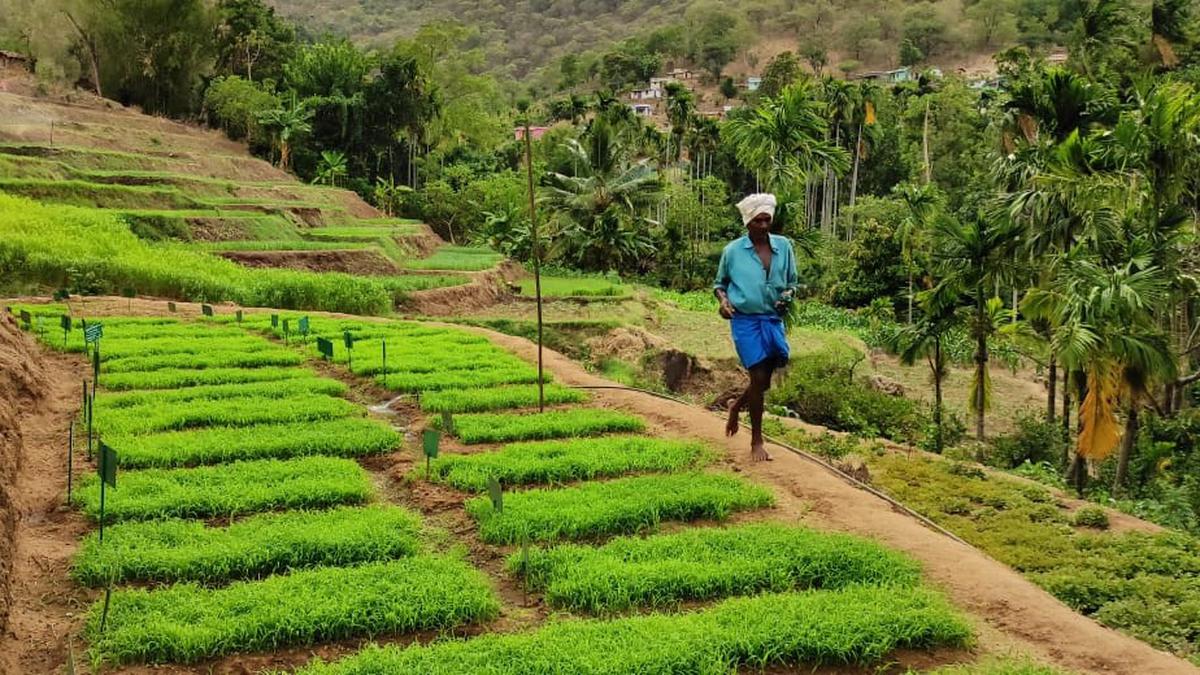
How the tribal settlements in Chinnar Wildlife Sanctuary are reviving cultivation of millets and endemic crops through Punarjeevanam scheme
The Hindu
how kerala forest department revives millet cultivation and of endemic crops in chinnar in idukki district through punarjeevanam scheme
“Ragi dish Korangatti is had for breakfast, lunch and dinner. Accompanying it would be a curry made of vegetables that are in season or a non-vegetarian dish. Beans, pumpkin and amaranthus are some of the vegetables that we usually cook. Anchovy, crab curry and meat are also served as sides,” explains M Chandran, a member of the Muduvan tribe from Thayyannankudy settlement under Chinnar Wildlife Sanctuary, Idukki.
Chandran was explaining how millets, especially ragi, has been a constant in their diet, along with other millets. They now grow 34 varieties of ragi, with millets such as chama (little millet), thina (foxtail millet) and varagu (kodo millet) and multiple varieties of beans, amaranthus, maize and pumpkin. This was made possible by Punarjeevanam project of Kerala Forest and Wildlife Department.
“Korangatti is a glutinous dish, slightly bigger than an idli, made from ragi flour that is cooked in boiling water to a halwa-like consistency. It is poured onto a plantain leaf and is left to set. No sugar or salt is added,” he adds.
Punarjeevanam (revival or resurrection) was launched in 2016 to revive farming of millets and endemic crops in the tribal settlements under Chinnar Wildlife Sanctuary, which comes under Munnar Wildlife Division. The project, also involving Anamudi Forest Development Agency, has completed the seventh phase.
There are 11 tribal settlements comprising Muduvan and Hill Pulaya communities under the Wildlife Division. “The cultivation is primarily in Thayyannankudy settlement and it is now being extended to a few more settlements. We have also started outreach programmes,” says Vinod SV, Chief Wildlife Warden, Munnar Wildlife division.
One such initiative is at the Institute of Human Resources Development (IHRD) College of Applied Sciences at Kanthalloor, Idukki, where there is a millet garden on 75 cents with varieties of ragi, chama, thina and varagu.
The genesis of Punarjeevanam was the emphasis on participatory forest management in the National Forest Policy 1988. Medical camps conducted for the tribals under the division by the Forest Department found that the children were malnourished and anaemic, while adults had to deal with various lifestyle diseases, especially diabetes. After interacting with the heads of various tribal settlements, the officials concluded that a change in the food habits of the tribals was the root cause of their undernourishment and lifestyle health issues.





















 Run 3 Space | Play Space Running Game
Run 3 Space | Play Space Running Game Traffic Jam 3D | Online Racing Game
Traffic Jam 3D | Online Racing Game Duck Hunt | Play Old Classic Game
Duck Hunt | Play Old Classic Game











